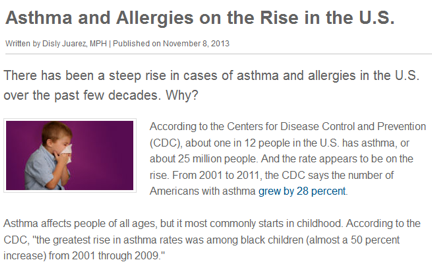Humans can live for weeks without food, days without water, but only minutes without air. While most folks aren’t worried about the latter item, not being able to breathe is a real concern for people who suffer from asthma. It’s concerning, then, that more and more people are developing this problematic respiratory disease, as reported in this Healthline.com article:
According to the Centers for Disease Control and Prevention (CDC), about one in 12 people in the U.S. has asthma, or about 25 million people. And the rate appears to be on the rise. From 2001 to 2011, the CDC says the number of Americans with asthma grew by 28 percent.
Asthma affects people of all ages, but it most commonly starts in childhood. According to the CDC, “the greatest rise in asthma rates was among black children (almost a 50 percent increase) from 2001 through 2009.”
With the number of asthmatic people on the rise, greater awareness is needed when it comes to identifying possible triggers. After all, dust and pollen are not the only triggers to watch out for—unexpected ones may be lurking in your very home.
Molds
Leak-free roofing in Delaware, OH homes is a must, because a leaky roof can encourage the growth of molds, a microscopic fungi that thrive on damp and humid places like attics or wall spaces. To reproduce, molds release spores in the air that can trigger asthmas attacks if inhaled by people.
If your roof is leaking, call on leading contractors like Muth & Company Roofing that can effectively repair Delaware and Gahanna, OH roofing to prevent mold from gaining a foothold in your home.
Cockroaches
As if people needed more reasons to despise cockroaches, experts now believe that proteins in roach saliva and feces can cause asthmatic episodes. Fortunately, you can keep them out of your home by keeping your house clean and storing food in airtight containers.
Volatile Organic Compounds
Things like air fresheners, paints, and cleaning products contain volatile organic compounds (VOCs), fumes that can induce asthma by irritating the airways. If you or a family member has asthma, try switching to or utilize only low-VOC or VOC-free products in the house.
(Article Information and Image from Asthma and Allergies on the Rise in the U.S., HealthlineNews, November 08, 2013)


